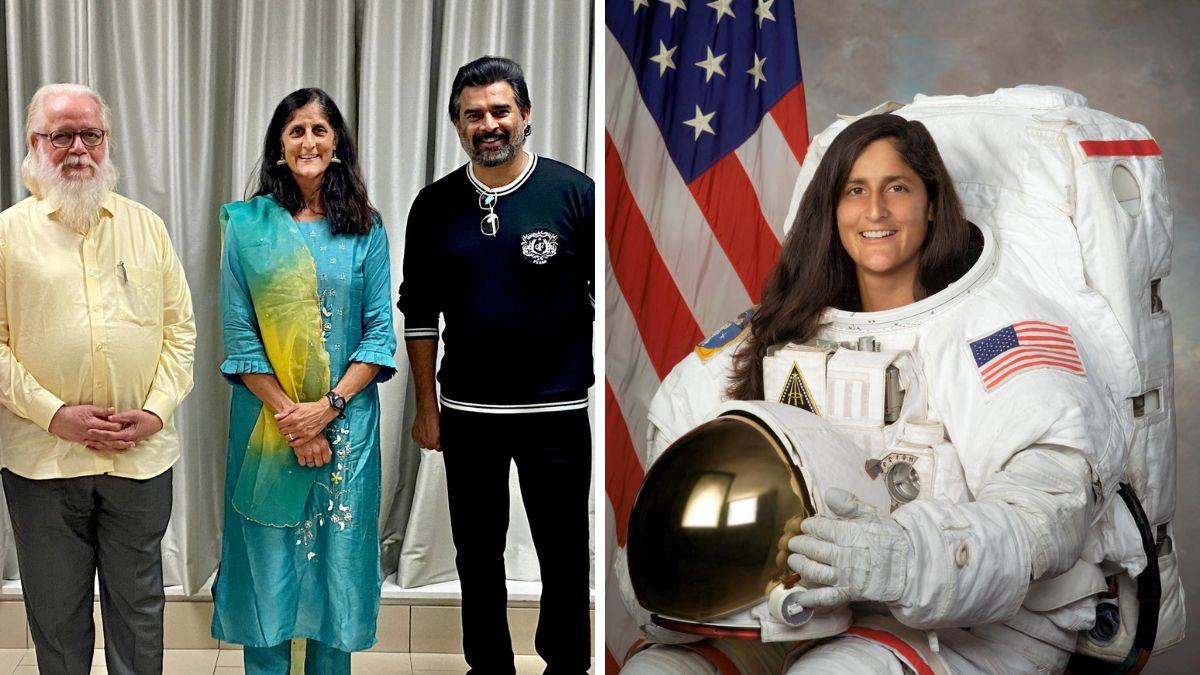


Indian-American NASA astronaut Sunita Williams, currently aboard the International Space Station, will celebrate Thanksgiving in space with traditional holiday dishes such as smoked turkey and mashed potatoes provided by NASA. With her stay extended to eight months due to a faulty spacecraft, Williams and her crewmates Butch Wilmore, Nick Hague, and Aleksandr Gorbunov plan to enjoy a feast while watching the Macy's Thanksgiving Day Parade. Despite concerns about their prolonged stay in space, NASA has reassured that the astronauts are safe and Williams is keeping healthy through diet and exercise.
Thanksgiving in Space: Indian-American Astronaut Sunita Williams Celebrates Holiday with Mashed Potatoes and Smoked Turkey
With the Thanksgiving holiday approaching, Indian-American astronaut Sunita Williams, who is currently aboard the International Space Station (ISS), will be celebrating the occasion in space with traditional holiday dishes such as smoked turkey and mashed potatoes provided by NASA.
Williams, whose stay has been extended to eight months due to a faulty spacecraft, and her crewmates Butch Wilmore, Nick Hague, and Aleksandr Gorbunov, plan to enjoy a feast while watching the Macy's Thanksgiving Day Parade. Despite concerns about their prolonged stay in space, NASA has reassured that the astronauts are safe and Williams is keeping healthy through diet and exercise.
Background:
Sunita Williams is a veteran astronaut who has spent over 322 days in space across three missions. She is the second Indian-American astronaut and the first woman to command the ISS. Her current mission began in March 2022 and was originally scheduled to end in September. However, the failure of a Russian spacecraft delayed the arrival of a replacement crew, extending Williams' stay.
Thanksgiving in Space:
NASA has provided the astronauts with a special menu for Thanksgiving, including smoked turkey, mashed potatoes, stuffing, cranberry sauce, and pumpkin pie. They will also have a live video call with their families on Earth and watch a recording of the Macy's Thanksgiving Day Parade.
In the past, astronauts have celebrated Thanksgiving in space with various meals. In 1973, the crew of Skylab 4 enjoyed a Thanksgiving meal that included turkey, mashed potatoes, and gravy. In 1988, the crew of the space shuttle Discovery cooked a Thanksgiving turkey in space for the first time.
Top 5 FAQs:
1. Is it safe for astronauts to spend such a long time in space?
NASA has determined that Williams and her crewmates are safe and healthy. The astronauts undergo rigorous training and follow strict protocols to minimize the risks of long-duration spaceflight.
2. What are the challenges of celebrating Thanksgiving in space?
The lack of gravity in space presents challenges for cooking and eating food. Astronauts must use special tools and techniques to prepare and consume their meals. They also must deal with the psychological effects of being away from their families and loved ones during the holidays.
3. What other traditions do astronauts observe in space?
Astronauts often celebrate other holidays and milestones in space, such as Christmas, New Year's Day, and their birthdays. They also participate in educational and outreach activities to share their experiences with people on Earth.
4. How do astronauts cope with being away from their families during the holidays?
Astronauts typically have regular communication with their families and friends through video calls and email. They also keep busy with their work and training to help pass the time.
5. What is the significance of Sunita Williams' Thanksgiving celebration in space?
Williams' celebration highlights the dedication and sacrifices made by astronauts who spend extended periods away from home to advance space exploration. It also represents the growing diversity of the space workforce and the global reach of the space program.

Every year, India celebrates the birth anniversary of the renowned physicist CV Raman, who is known for his groundbreaking work on light scattering and the Raman Effect. Despite receiving numerous offers to work in Western labs after winning the Nobel Prize in Physics, Raman remained committed to his belief in fostering a strong scientific culture in India and mentoring future scientists. His discovery of the Raman Effect continues to be relevant and widely used in various fields today, serving as a testament to the quantum nature of light and the energy levels in molecules.

As meditation gains popularity as a mental well-being tool, concerns about potential side effects have emerged. A recent study by a team of researchers from the University of Melbourne delved into the prevalence of adverse experiences among meditators in the United States. By recruiting nearly 900 adults from various meditation skill levels, the study aimed to provide more accurate estimates of how common these side effects are and what factors may contribute to experiencing them. The findings highlight the need for clearer reporting standards in future research on meditation.

Prime Minister Narendra Modi launched a groundbreaking research, development and innovation scheme that will provide a boost to the flourishing ecosystem of innovation in India. In his address at the Emerging Science, Technology and Innovation Conclave, PM Modi highlighted the crucial role of science and technology in driving transformation and emphasized on India's significant progress in the field. He also acknowledged the remarkable achievement of India's women's cricket team and expressed confidence that their success would inspire the country's youth. Attendees included renowned scientists, innovators, and distinguished guests from both India and abroad.

Indian Prime Minister Narendra Modi inaugurated the Emerging Science and Technology Innovation Conclave (ESTIC) 2025 and launched the Rs 1 lakh crore Research Development and Innovation (RDI) Scheme Fund. The scheme aims to strengthen the private sector-driven research and innovation ecosystem in the country and has a total outlay of Rs 1 lakh crore over 6 years. ESTIC 2025, gathering over 3,000 participants, focuses on 11 critical thematic areas including Artificial Intelligence, Quantum Science and Technology, and Space Technologies, providing opportunities for collaboration and reinforcing India’s science and technology ecosystem.

In this edition of Health360, a renewed debate over the alleged link between vaccines and autism is sparked by tech mogul Sridhar Vembu's endorsement of a questionable study. Despite reassurances from the medical community backed by data from the WHO, doubts continue to persist, leading to potential harm to public health. The program also delves into the alarming rise in back pain cases in India and explores new treatments.

In an effort to fight the ongoing air pollution crisis, Delhi conducted its first-ever official cloud seeding operation led by IIT Kanpur. The operation involved a small aircraft dispersing specially designed chemical flares into the atmosphere to create rain. While experts say rainfall could occur within 15 minutes to 4 hours, the actual timeframe depends on various factors such as wind direction and moisture content. If successful, the government plans to continue the operation in the coming days.

In the quest for stronger, luscious hair, we often overlook the importance of nurturing the roots. Fortunately, Ayurveda has long stressed the significance of this practice, which has now been backed by modern science. Studies have shown that herbs like Bhringraj and Amla can activate hair follicles, promoting new growth and delaying greying. Fenugreek, Neem, Hibiscus, and Ashwagandha are also found to be beneficial in strengthening and nourishing the scalp, resulting in thicker and healthier hair.

A college student shares her personal journey of becoming a vegetarian, despite facing challenges and health concerns. She then delves into an ethics class she took, where the concept of marginal cases were discussed. Following an article by philosophy professor Alastair Norcross, she concludes that even though individual action may seem insignificant, refusing to consume factory-farmed meat holds moral significance due to the potential to prevent immense suffering for animals.

On October 24, the global community commemorates World Polio Day to honor the legacy of Dr. Jonas Salk and the efforts of countless individuals and organizations in the fight against polio. This highly contagious and potentially deadly disease, once a widespread epidemic, is now largely preventable thanks to the development of a life-saving vaccine. India's successful eradication of polio serves as a testament to the importance of strong vaccination programs and collaborations in public health initiatives.

As winter arrives in India, so does the hazardous air pollution. Delhi NCR's AQI has already crossed the 400 mark, making it crucial to invest in air purifiers, especially after Diwali. Dyson, Qubo, HomePure, and Philips have launched high-quality air purifiers with advanced features to tackle different types of pollutants and create cleaner indoor air. With prices ranging from Rs 5,000 to Rs 1 lakh, these purifiers are a practical and timely purchase for a healthier living.